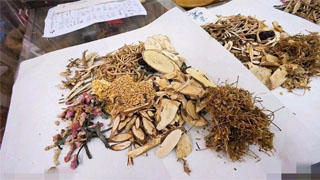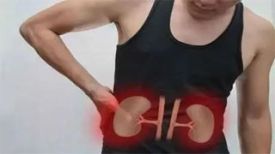
The recipe introduced today is founded by Qian Yi. You may not be familiar with Qian Yi, but you must have heard of Qian Yi's Liuwei Dihuang Pill.
In addition to Liu Wei Di Huang Wan, Qian Yi also has a particularly interesting prescription called Xie Huang San.
Xie means to expel fire, and yellow belongs to the earth element in traditional Chinese medicine, corresponding to the spleen and stomach. Therefore, Xie Huang San is used to expel fire from the spleen and stomach. Of course, you can also call it another name, Xiepi San, which sounds much more straightforward.
In previous articles, we always emphasized that traditional Chinese medicine says that when purging fire, it is necessary to distinguish between deficiency and excess. If there is deficiency, it should be supplemented, but in reality, it should be eliminated. However, the fire referred to here is neither real nor virtual, but a hidden fire.
Note that a new term "fu huo" has appeared here. Fu Huo and Shi Huo are not quite the same, and Shi Huo and Xu Huo are not the same. How can they be different? For ease of understanding, let's make an analogy.
In some areas without heating, heating in winter is a big problem, and starting a stove has become the most convenient and practical way. The flames burning fiercely in the stove are solid fire. Although the solid fire burns vigorously, it is also easy to extinguish. Just pour a pot of water down to solve it. In traditional Chinese medicine, it means clearing heat and detoxifying.
What is virtual fire? Virtual fire is when a pot of water is placed on the stove, and the water immediately dries up. At this point, the temperature of the pot wall is very high. To lower the temperature, water needs to be added to the pot, which is to nourish yin and reduce fire.
After understanding these two points, let's take a look at Fu Huo.
Old people who know how to light a stove know that it doesn't need to be lit every day. They just need to keep the fire source and cover it with the ash from the charcoal. The next day, they can remove the ash and add some wood. Soon, the fire will start and the room will be warm. This is Fu Huo. Fu Huo is meant to be hidden. Don't you think Fu has the meaning of lurking and hiding?
There is a hidden fire in the spleen and stomach, and the fire energy flows up the esophagus until it reaches the mouth. Traditional Chinese medicine says that the spleen opens its orifice in the mouth and its radiance is on the lips. And the relationship between the spleen and the stomach is very close, it can be said that there is no distinction between us. In other words, people with good spleen and stomach have rosy and glossy lips, while those with weak spleen and stomach are prone to various lip problems.
From the spleen and stomach to the esophagus, to the throat, and then to the mouth, they follow the same route. After the lips are fumigated by fire, they will experience dryness, peeling, pain, and even redness and itching around the entire lip area, making people involuntarily want to lick their lips, and the more they lick, the more severe it becomes. It can also cause sores, the most common being oral ulcers, and bad breath.
The application of Xiehuang San was born, and the "Collection of Medical Formulas" states that it is specifically used to treat "spleen and stomach fire, dry mouth and lips, mouth sores and bad breath, irritability and thirst, easy hunger, and heat in muscles
Xiehuang San: 1g Gardenia jasminoides, 5g Gypsum, 40g Windproof, 30g Licorice, and 7g Huoxiang. Grind these herbs into fine powder and take 3-6 grams each time.
Solid fire needs to be expelled, deficient fire needs to be replenished, and how to extinguish dormant fire?
Before answering this question, let's first take a look at how Fu Huo came about. In one sentence, depressed. The spleen and stomach are like wheels, constantly rotating, with the spleen leading the rise and the stomach leading the fall. The spleen lifts up the clear qi and the stomach lowers the turbid qi. The rise and fall of the spleen and stomach are disrupted, and the qi is trapped there. Over time, the stagnation turns heat into fire.
Traditional Chinese medicine has a unique treatment approach for this, called 'fire stagnation'.
The first ones to come on stage are Huoxiang and Fangfeng, which can release spleen and stomach qi. As I just said, this' fu huo 'is the result of the stagnation of qi and the lack of clear qi rising and turbid qi descending. Therefore, using Huoxiang and Fangfeng to restore the spleen and stomach qi is crucial.
In addition, the essence of 'fu' lies in the word 'fu'. If there is no hiding of furnace ash, can this spark still be preserved? Of course not.
Windproof is also a wind medicine that can blow off the layer of dust covering the fire. Huoxiang plays an auxiliary role, and Huoxiang adds windproof, leaving the fire nowhere to hide and completely exposed to the outside.
Next, whether it's a hidden fire or a real fire, there is a fire. Since there is a fire, it must be extinguished, right. Gardenia and gypsum are equally important. When these two medicines are removed, it's like pouring a bucket of water on a spark.
Someone may ask, when we talked about extinguishing a fire earlier, we need to pour a basin of water down. How did it turn into a bucket of water here? The fire is burning fiercely, it's a raging fire. If you don't believe me, throw a piece of charcoal into the stove and it will quickly burn up.
As for Fu Huo, you can faintly feel its warmth, but you cannot see the burning open flame. The characteristic of Fu Huo is that it is easy to reignite, but the burning is not very intense. This ladle of water can be easily poured down to extinguish it, so the amount of gardenia and gypsum used is not large. Gypsum uses 5 grams, while gardenia uses even less, only 1 gram.
From the perspective of positive qi, both of these medicines have a slight coldness, and using them can easily damage the positive qi of the spleen and stomach. The importance of the spleen and stomach as the foundation of postnatal development is self-evident. Qian Yi means that the dosage should be light, four ounces of gold should be used, and the point should be reached immediately.
Licorice is the ultimate tonic, which can balance various medicines while also taking care of the spleen and stomach.
Finally, spleen and stomach tonifying fire and spleen and stomach tonifying fire are two different things, and their treatment methods are also different. People with tonifying fire have a good appetite, eat a lot, and get hungry quickly. People who are prone to fire do not eat much and have little appetite. Everyone should pay attention to distinguishing this point.


